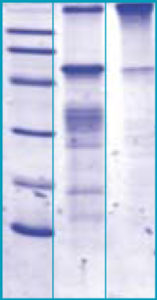Lipoprotein Lipase Human E. coli
Lipoprotein lipase (LPL) is the central enzyme in plasma triglyceride hydrolysis and is secreted by macrophages in the subendothelial space. Evidence has been provided that LPL produced by macrophages in the vessel wall exerts proatherogenic effects. The atherogenic effects of LPL have been mainly attributed to its ability to favor lipid accumulation within macrophages present in the atherosclerotic lesion. Recently, it has also been shown that LPL promote the development of atherosclerosis through facilitation of monocyte adhesion to endothelial cells, stimulation of tumor necrosis factor alpha (TNF ) secretion and induction of vascular smooth muscle cell proliferation.
Type
Recombinant
Description
Total 458 AA. MW: 51.61 kDa (calculated). UniProtKB acc.no. P06858. N-Terminal His-tag, 10 extra AA (highlighted).
Source
E. coli
SDS-PAGE Gel
14% SDS-PAGE separation of Human LPL
1. M.W. marker – 14, 21, 31, 45, 66, 97 kDa
2. reduced and boiled sample, 5μg / lane
3. non-reduced and non-boiled sample, 5μg / lane

Formulation
Filtered (0.4 μm) and lyophilized from 0.5 mg/ml in 50mM Acetate beffer, pH=4.0
Reconstitution
Add 0.1M Acetate buffer pH4 to prepare a working stock solution of approximately 0.5 mg/mL and let the lyophilized pellet dissolve completely. For conversion into higher pH value, we recommend intensive dilution by relevant buffer to a concentration of 10μg/mL. In higher concentrations the solubility of this antigen is limited. Filter sterilize your culture media/working solutions containing this non-sterile product before using in cell culture.
Applications
Western blotting
Shipping
At ambient temperature. Upon receipt, store the product at the temperature recommended below.
Storage/Expiration
Store lyophilized protein at –80°C. Lyophilized protein remains stable until the expiry date when stored at –80°C. Aliquot reconstituted protein to avoid repeated freezing/thawing cycles and store at –80°C for long term storage. Reconstituted protein can be stored at 4°C for a week.
Quality Control Test
BCA to determine quantity of the protein.
SDS PAGE to determine purity of the protein.
LAL to determine quantity of endotoxin.
– Miyashita K, Kobayashi J, Imamura S, Kinoshita N, Stanhope KL, Havel PJ, Nakajima K, Machida T, Sumino H, Nara M, Murakami M. A new enzyme-linked immunosorbent assay system for human hepatic triglyceride lipase. Clin Chim Acta. 2013 Sep 23;424:201-6

